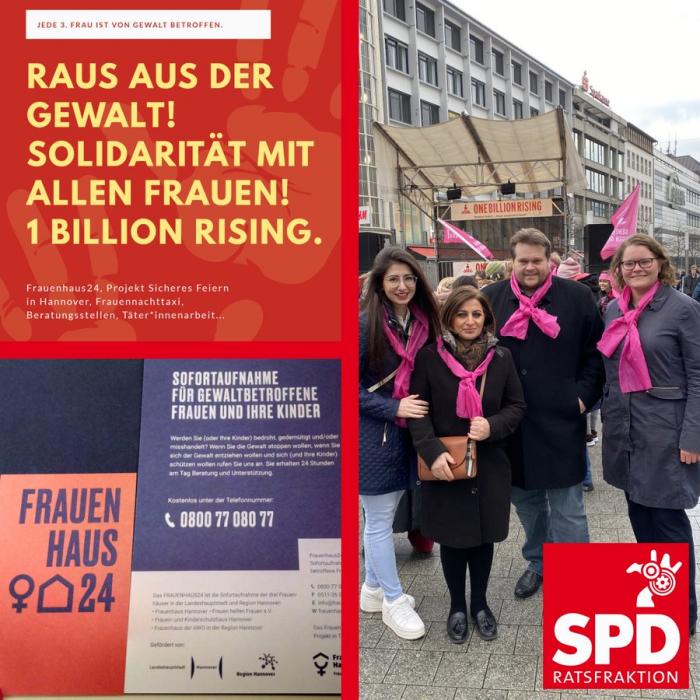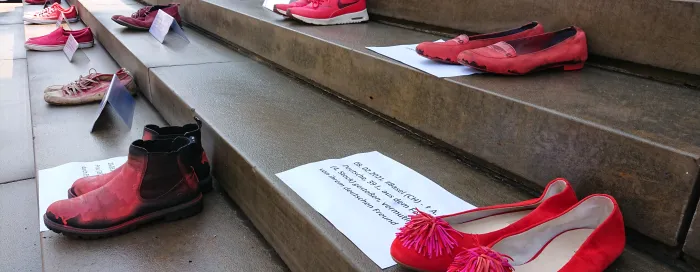This best practice is part of our series “#ProgressiveLocalStories”, aiming at raising awareness on the many positive initiatives implemented by progressive cities and regions in Europe in relation to the Sustainable Development Goals (SDGs). It focuses on SDG 5 (gender equality), which aims at ending all forms of discrimination against women and girls and at eliminating all forms of violence against women and girls in the public and private spheres.
One in three women has experienced physical, sexualised or psychological violence at least once in the course of her life. This affects women from all social classes. This is something we cannot accept and have to fight, especially at the local level, because this is where people live.
Not only are we morally obliged to fight it; we are also legally bound to do so. On 1 February 2018, the Istanbul Convention entered into force in Germany. The 81 articles of the convention contain comprehensive obligations to prevent and combat violence against women and domestic violence, to protect victims and to punish perpetrators. It also includes a requirement to provide safe spaces for women in shelters for women fleeing domestic violence.
Hannover, the capital of Lower Saxony, a region in northern Germany, had already taken measures to prevent domestic violence: in 2018, there were three shelters for women fleeing domestic violence in the Hannover area; the city also supports a large number of women‘s counselling centres that advise and support women affected by domestic violence.
In addition, the Hannover Intervention Programme against Domestic Violence (HAIP) has existed for more than 20 years, providing an interdisciplinary network of specialised counselling centres, the local authorities, the police, the judiciary and women's shelters. The HAIP aims to offer comprehensive protection, help and support for people affected by domestic violence.
However, this was not enough, we had to act to further reduce the risk of domestic violence and meet the criteria of the Istanbul Convention.
The specific starting point was a hearing that took place in our city‘s Equal Opportunities Committee on September 3, 2018. At the hearing on “Implementing the Istanbul Convention with a focus on access to women's shelters”, several experts were invited to contribute their perspectives on expanding the women's shelter landscape.

Afterwards, we, the Social Democrats, drew up a list of practical measures to create a more sophisticated system of prevention against domestic violence, which involved:
- creating more spaces in shelters for women fleeing domestic violence, including special places for transitional housing for the period of time immediately after leaving a women‘s shelter, providing low-threshold support in everyday situations (so called “second-stage housing”).
- creating a special shelter for emergency cases of domestic violence.
- creating a special shelter to meet the needs of young women.
- providing access to safe daytime sleeping spaces for sex workers.
- providing more accommodation for homeless women.
- expanding counselling services for female offenders in order to prevent repeat offending, even though women account for only 10% of all offenders.
- expanding counselling services for boys and young men as offenders, to educate them about different role models of masculinity and counselling services for boys and men as victims of domestic violence.
- drawing up a concept for the prevention of sexualised violence in nightclubs and bars together with operators of music and party events, with the “Emergency call for raped women and girls Hannover e. V.”, with the counselling institution for girls and women “Violetta e.V.” and with other partners, creating an emergency network in the Hannover nightlife scene (called “We Take Care”).
- building affordable housing so that women's shelter spaces are freed up again for women who have been affected by domestic violence and are not occupied by women who are empowered enough to return to normal everyday life but who still need affordable housing.
Together with our political partners, we increased funding by 1.15 million euros in 2019/2020 to create more safe spaces in women's shelters. This was a significant milestone. Setting up the immediate admission shelter (Frauenhaus.24), which currently has nine places, has made it possible for women and their children to find shelter promptly and not have to wait until a place becomes available. In addition, the shelter for 18- to 25-year-old women affected by violence, has contributed to target group-specific provision for young women, thus expanding the women's shelter landscape in Hannover.
These projects have increased the number of women‘s shelter places in Hanover by 24, to 120 places. This is not only a quantitative improvement; by targeting specific groups, we are also able to provide higher quality services. Furthermore, we have an initial design for a special agency providing services for homeless women, including spaces to sleep and to store belongings and help with accessing medical help and counselling (Projekt Berta).
We have increased funding for the counselling agencies described above. Nightlife has become safer for women* through the creation of an emergency night network (“We Take Care”) and a women's night-time taxi service.
The city has provided easier access to daytime sleeping spaces for sex workers.

We are proud that we, as Social Democrats, have helped make Hannover a safer space for women and their children. This does not mean that we have reached the end of our efforts to create a complex violence prevention system in which all measures fit together like cogs. We have to evaluate whether the projects that have already been implemented or are still in the planning will have the desired effect and whether all women affected by violence in Hannover will ultimately receive the protection and help they need.
In addition, there is still a need for networking on the topics of transitional housing and there are other needs that a diverse and differentiated women's shelter landscape must address. These include the special situation of trans women who are affected by violence and also seek protection in a women's shelter. We need to take action on issues such as anti-feminism, hate-speech and catcalling as possible precursors to violence. It is therefore important to continue the good cooperation between politicians, supporting organisations and the local authorities to help women affected by violence.
Wichtige Aktion heute vor dem @LT_Nds: Kein Staat darf sich der Verpflichtung entziehen, Frauen vor häuslicher #Gewalt und #Femiziden zu schützen. Die #Istanbulkonvention ist eine wichtige Errungenschaft für #Gewaltprävention und den Ausbau der #Frauenhäuser! pic.twitter.com/Pi2WCQf5W1
— VorwärtsNachRot© (@HannoverCARLing) April 29, 2021
***
Maxi Ines Carl is an SPD local councillor in Hannover, Germany. She is spokesperson of the city's Equal Opportunities Committee and member of the Youth Welfare Committee. She is part of our network of young progressive local and regional leaders.
Photo credits: Maxi Ines Carl
